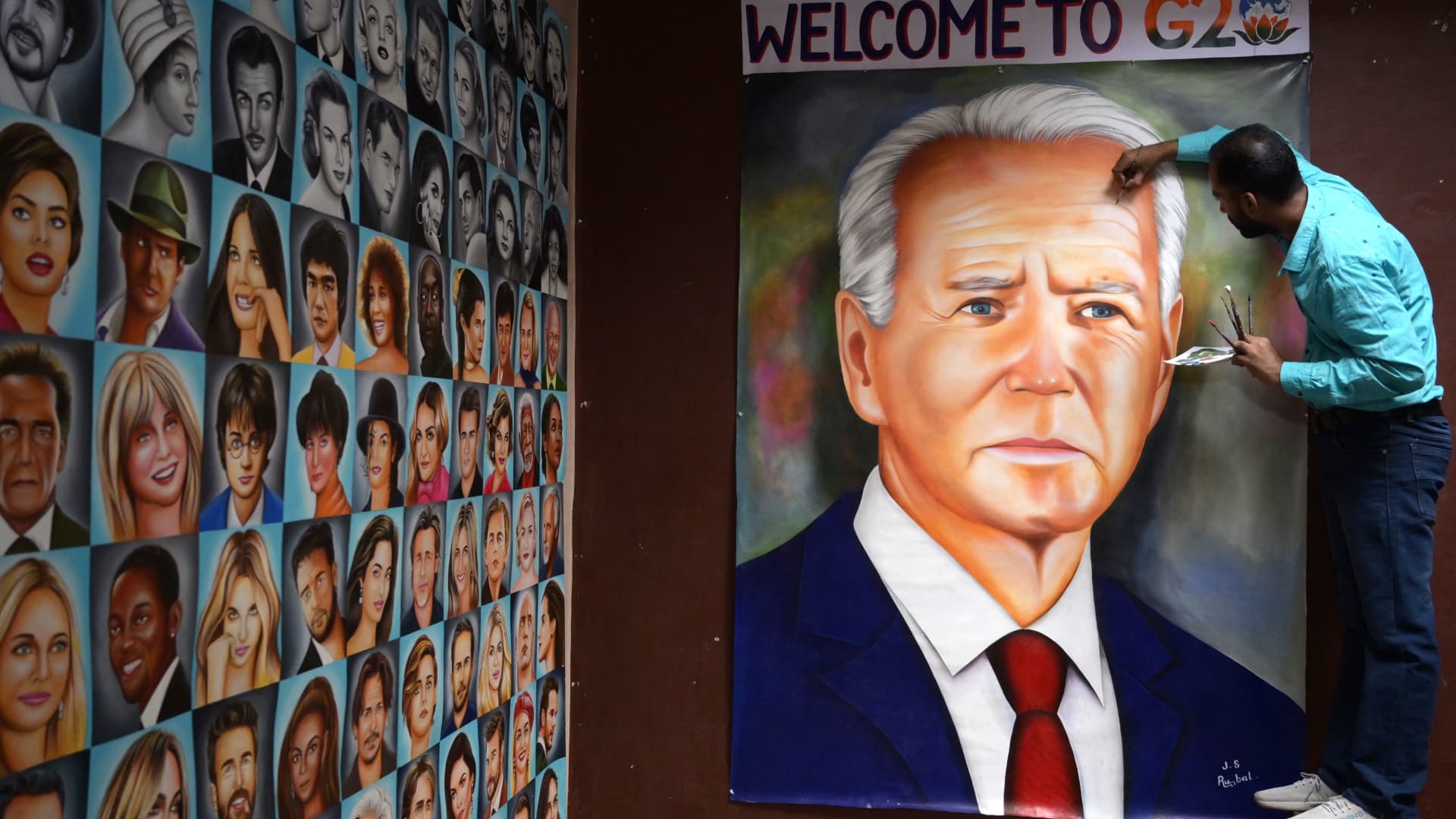Indian artist Jagjot Singh Rubal adds the final touches to an oil painting of U.S. President Joe Biden at his workshop in Amritsar on September 5, 2023, just before the start of the two-day G20 summit in New Delhi (Narinder Nanu | AFP | Getty Images).
NEW DELHI – Indian Prime Minister Narendra Modi and U.S. President Joe Biden have pledged to strengthen the partnership between their countries during their second bilateral meeting in less than six months. This meeting comes as Delhi prepares to host a gathering of G20 leaders from leading industrialized and developing countries.
The two leaders met briefly at Modi’s official residence after Biden arrived in Delhi. They issued a 29-point statement, emphasizing the depth and breadth of their relationship in a time of evolving global alliances. The statement highlights various areas of collaboration, including the development of strategic technology value chains, defense cooperation, renewable and nuclear energy, climate financing, and cancer research.
Of particular significance was their reaffirmation of the importance of the Quad in supporting a free, open, inclusive, and resilient Indo-Pacific region. They also expressed appreciation for the progress made since Modi’s historic visit to Washington in June 2023. The Quad, consisting of Australia, India, Japan, and the U.S., was formed as a response to China’s growing influence in the Indo-Pacific region.
This closed-door meeting with Biden was part of Modi’s strategic agenda, as India aims to position itself as a key player connecting the developed world and the Global South. It is one of many bilateral meetings scheduled for this weekend, highlighting India’s ambitions as a global power.
The G20 summit is crucial for Modi, who has used India’s presidency to assert its geopolitical importance ahead of next year’s national elections. With China’s economic growth slowing down, many governments, investors, and businesses are turning their attention to India — the fastest growing economy projected by the International Monetary Fund this year.
The summit’s agenda includes the anticipated admission of the African Union as an official G20 member. India’s focus on elevating the Global South and promoting inclusive and sustainable growth within the multilateral forum is evident.
However, both Russian President Vladimir Putin and Chinese President Xi Jinping will be absent from the summit. Putin’s absence can be attributed to a warrant issued by the International Criminal Court for his arrest on charges of war crimes in Ukraine. Xi’s reason for skipping the G20 meeting remains unclear, leading to speculation that he may be snubbing Modi for various reasons.
The absence of these two influential leaders raises concerns that a binding communique may not be issued, undermining India’s influence and domestic messaging. India’s diplomats have faced challenges in reaching binding agreements due to objections from Russia and China regarding the wording related to the war in Ukraine.
Despite these obstacles, India and the U.S. hope to position themselves as viable alternatives to China, particularly in areas such as food security and debt resolution. In their joint statement, Biden and Modi expressed confidence in the G20’s outcomes and their shared commitment to accelerating sustainable development, bolstering multilateral cooperation, and reshaping global economic policies.
India’s warming relations with the U.S. stand in stark contrast to its strained relationship with China. India, along with other countries in the region, strongly criticized China’s recent national map that claims disputed territories as its own. Indian companies also stand to benefit from American companies looking to diversify their supply chains away from China. The U.S. has been tightening restrictions on the transfer of strategic technology to China due to national security concerns.
Modi and Biden envision a lasting partnership that contributes to a brighter future for both countries, serves the global good, and supports a free, open, inclusive, and resilient Indo-Pacific region.
Denial of responsibility! Vigour Times is an automatic aggregator of Global media. In each content, the hyperlink to the primary source is specified. All trademarks belong to their rightful owners, and all materials to their authors. For any complaint, please reach us at – [email protected]. We will take necessary action within 24 hours.


